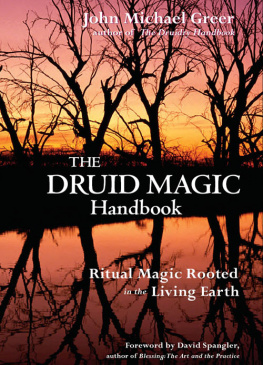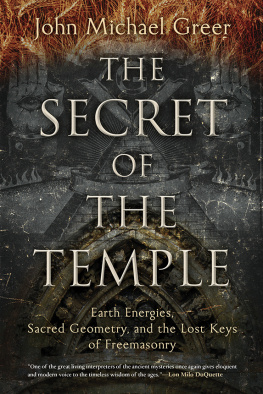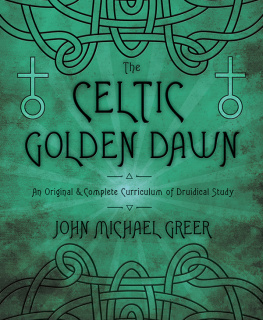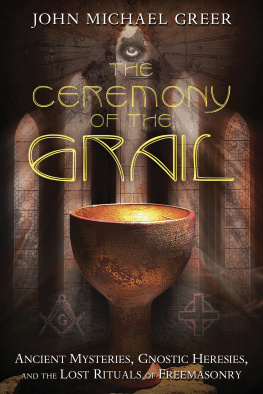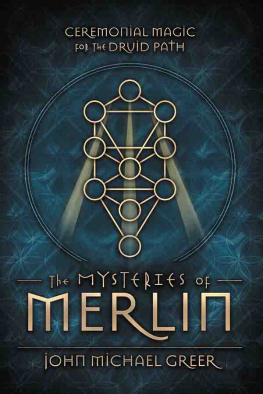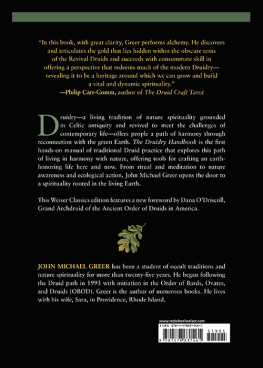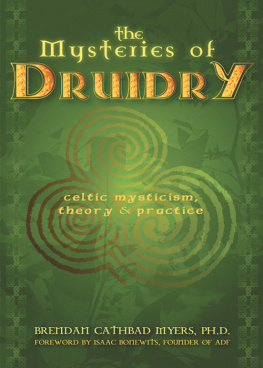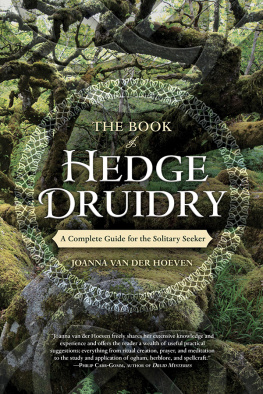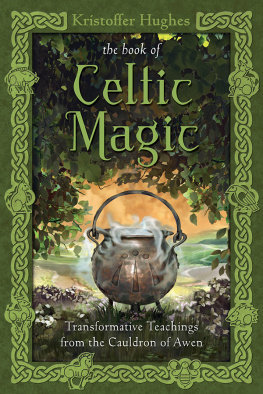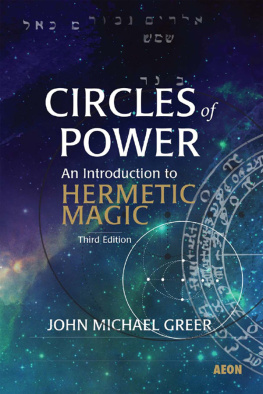
First published in 2007 by
Red Wheel/Weiser, LLC
With offices at:
500 Third Street, Suite 230
San Francisco, CA 94107
www.redwheelweiser.com
Copyright 2007 by John Michael Greer.
Foreword copyright 2007 by David Spangler.
All rights reserved. No part of this publication may be reproduced or transmitted in any form or by any means, electronic or mechanical, including photocopying, recording, or by any information storage and retrieval system, without permission in writing from Red Wheel/Weiser, LLC. Reviewers may quote brief passages.
Library of Congress Cataloging-in-Publication Data
Greer, John Michael.
The Druid magic handbook : ritual magic rooted in the living earth / John Michael Greer ; foreword by David Spangler.
p. cm.
Includes bibliographical references and index.
ISBN 978-1-57863-397-5 (alk. paper)
1. Druids and druidism. 2. Magic, Celtic. I.Title.
BL910.G746 2007
299'.16133--dc22
2007033118
Cover and text design by Donna Linden
Typeset in Centaur and Perpetua
Cover photograph Larry Brownstein/Getty Images
Oak tree illustration Rich Harris/iStockphoto
Printed in Canada
TCP
10 9 8 7 6 5 4 3 2 1
CONTENTS
FOREWORD
When, in the early '70s, I was a codirector of the Findhorn Foundation Community, an international spiritual center in the north of Scotland, I had the pleasure of knowing and working with Robert Ogilvy Crombie (or ROC, as he was known by his friends). He was a lively, gentle, and loving elderly Scot who was a Hermetic magician. Though he lived in Edinburgh, he was a frequent visitor to the community and an integral part of its spiritual life. Findhorn is best known around the world for its contact with the inner kingdoms of naturethe spiritual intelligences behind all growing things. Part of this contact was made by Dorothy Maclean, one of the three founders of the community, whose specialty was communication with the devas or angels of various plant species. It was ROC, though, who had contact and communication with the elemental forces of nature, the Nature Spirits. This contact was his most public contribution, but behind the scenes, he had a special role as the community's guardian. It was in this regard that I came to know and respect his magical skills and knowledge.
For his ceremonial work, ROC said he used the tradition originating with the fabled Order of the Golden Dawn, the famous magical lodge established in England in the late 1880s that became the renewing, driving force behind so much of the occultism and magic of the twentieth century. However, his training was something of a mystery. A heart ailment at an early age had kept him from holding a steady job. Told by doctors to seek out isolation and quiet, he lived for many years in a cottage in an ancient forest, rather Merlin-like. It was there that he made the deep contact with the forces of nature and, I believe, based on things he told me, it was there under their tutelage that he learned the basic principles of magic, principles he later augmented by extensive study in the fields of psychology, physics, and the Hermetic writings of Western magic.
Whatever the nature of his training, ROC clothed his magic in a context of attunement to nature. Although he lived in the center of a major city, nature was supremely important to him. Indeed, although he never claimed such a thing, I often felt in his presence that I was with a Druid.
In 1973, I returned from Findhorn and Scotland to pick up my work in the United States. Before I left, I had a final conversation with ROC in which he said he felt he was one of the last practitioners of an older tradition of magic. A new form of magic is unfolding, he said, I can see it, but it's not for me to do. It's for you and those of your generation and the next.
These words echoed something I had been told several years earlier. From childhood on, I have had an ongoing contact with nonphysical beings. One summer, right after my graduation from high school but before I entered college, I had had a short, unexpected visit from a being who said simply, In the future, a new form of spirituality will unfold. With it will come a new kind of magic. At the time, I had just stored this away under the Interesting-but-I-don't-know-what-to-do-about-it mental file. But ROC's words reawakened my alertness to new possibilities in the field of magic and spirituality.
However, although I had an interest in magic and practiced a very personal form of it that I wove out of my own inner experiences, my work and life took me in other directions. It was not for another twenty years that magic began to occupy my attention again in a serious way. By then I had begun to meet and work with modern magicians who were trained in the old methods but were transforming them through their own insights and experiences. People such as John and Caitlin Matthews, William Bloom, R. J. Stewart, and others seemed to me to be pushing at the envelope of the magical traditions and opening exciting possibilities for new directions in the magical arts. And I began my own experiments in that direction as well, exploring what I call an incarnational magic.
Then I came across a book that sent me on an expedition to find everything that its author had written. The book was Inside a Magical Lodge, one of the finest and clearest books on the magical tradition and its structure that I had found. The author was John Michael Greer, the writer of the excellent book you are now holding. Soon, thanks to the wonders of the Internet and the services of Amazon.com (and what Renaissance mage ever had such a willing and able invisible servant to bring him knowledge?), I had everything John Michael had written and was working my way through it with a rising excitement.
For what I discovered when I read Inside a Magical Lodge and, subsequently, his other books was three things: a brilliant scholarly mind that was deeply knowledgeable of the history and traditions of the magical arts, the practical wisdom of an experienced practitioner of those arts, and, most important from my point of view, the inner feel of someone on the track of formulating a new kind of magic for the twenty-first century.
I decided I wanted to get to know this man. But I had no idea where he was.
This is where magic stepped in. I had been invited to speak at a summer conference in Oregon near the Columbia River Gorge, a spectacularly beautiful area. The event was held in a rural camp under the trees. Early on the morning I was to give a workshop, I stood in the main clearing looking at a large board with the day's schedule on it and saw that the other speaker of the day was John Michael Greer! Hooray! Here would be my chance to meet him. But closer inspection saw that we were teaching at the same time in different areas of the camp. I would not be able to go hear him talk after all.
I heard a sigh behind me and saw a tall, bearded, handsome fellow standing a few feet away also contemplating the schedule board.
Conflicts? I asked.
Yes, he said.
Me, too. I really wanted to hear John Michael Greer, but I'm teaching a workshop at the same time.
Are you David Spangler? he asked.
Yes.
Well, I'm John Michael Greer, and I wanted to hear you!
If there was no magic behind this meeting, then I will eat my hat. But even magic only goes so far. We still didn't get to hear each other that day. A friend of mine did go listen to John Michael, whose talk introduced some of the themes in this book, and he consoled me by telling meseveral times and at lengthjust how excellent John Michael had been!
Next page
